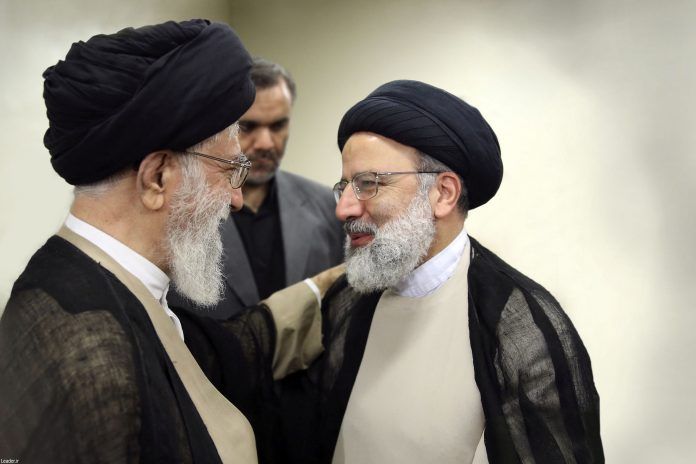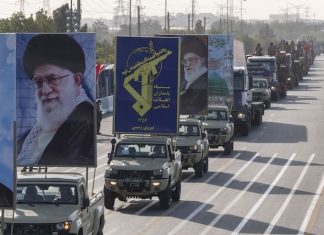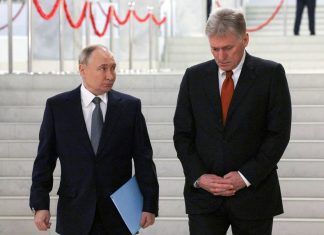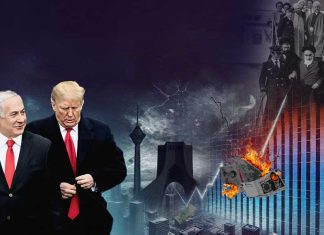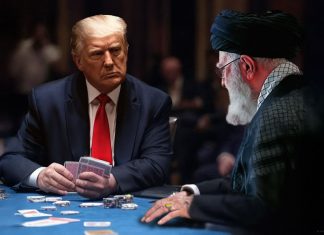By Ahmad Rafat
Sayyid Ebrahim Raisolsadati, better known as Ebrahim Raisi, will take office as the Islamic Republic’s eighth president on August 5.
The June presidential elections have differed in many aspects from all previous ones. For instance, while official reports estimated that less than 50 percent of eligible voters went to the ballot box, unconfirmed exit polls showed the number to be around 20 percent.
Official data also said that only close to 26 percent of eligible voters in Tehran cast their ballots on election day, meaning that only one out of four eligible voters went to the polls.
Some 14 percent of all the votes counted were also marked as invalid, and promptly discarded. That’s because many people reportedly preferred to go to the polling stations and mark their ballots as void rather than having to explain their reasons for not voting at all.
The results of the June presidential elections were a foregone conclusion in the minds of many Iranians, who believed Iran’s Supreme Leader Ayatollah Ali Khamenei had already selected Mr. Raisi to replace the outgoing President Hassan Rouhani. The leaders of the Islamic Republic appear to believe that by consolidating their power base, they will be more successful in tackling the social, political, and economic crisis plaguing the country.
Ebrahim Raisi was born in 1960 in Noghan District of Mashhad, the capital of the northeastern province of Khorasan Razavi. Raisi’s father died when he was only five years old.
Raisi began his religious studies in the hawza (Islamic seminary) after completing his primary education at Javadiyeh school. He moved to the holy city of Qom, 140 kilometers south of Tehran, where he enrolled in Ayatollah Borujerdi School.
Raisi has said that he received a doctorate in private law from Tehran’s Shahid Motahari University, but there is no evidence to support this.
Raisi was appointed prosecutor of Karaj (20 kilometers from Tehran), and Hamedan, capital of the northern province of Hamedan, in 1981 — when he was only 21 years old.
During the early days of the revolution, the late Seyyed Mohammad Beheshti, the head of the Supreme Judicial Organization of Iran and a close ally of Ayatollah Ruhollah Khomeini, the founder of the Islamic Republic, invited some 70 young clerics to join the country’s judicial system.
Raisi answered the call and moved to Tehran in 1982. He was appointed deputy prosecutor of Tehran and four years later became Tehran Prosecutor.
In 1983, Ebrahim Raisi married Jamileh-Sadat Alamolhoda, the eldest daughter of Seyyed Ahmad Alamolhoda, an influential Friday Prayer leader of Mashhad and a member of the Assembly of Experts. The marriage raised Raisi’s public profile and strengthened his ties to the Islamic Republic regime.
A year earlier, Ayatollah Khomeini had appointed Raisi to a four-member team that later became known as the “Death Commission.”
Raisi’s role in the country’s judicial system has come under great scrutiny in the past four decades, especially in the year 1988.
The other members of the “Death Commission” were Hosseinali Neri, Mostafa Pour-Mohammadi (former Justice Minister in President Rouhani’s first cabinet), and Morteza Eshraghi.
Ayatollah Khomeini had directed the commission to review the cases of thousands of political prisoners and prisoners of conscience, many of whom had already been tried and given prison sentences.
In most instances, the commission spent only a few minutes reviewing each case file before sentencing a prisoner to death. No one knows the exact number of people executed, given that almost all the victims were buried in unmarked graves in secret cemeteries.
The scale and extent of these mass executions became known only after a leaked audio recording of the conversation between the “Death Commission” and Grand Ayatollah Hosseinali Montazeri (1922-2009), who many believed would succeed Ayatollah Khomeini, became public.
In the recording, the committee members explained to Ayatollah Montazeri — who was against the mass execution of prisoners — that they had no choice but to carry out Ayatollah Khomeini’s order, claiming that they were trying to keep the number of people killed to a minimum.
However, recent comments by President-Elect Raisi contradict these claims.
Raisi held his first press conference with domestic and international media outlets as president-elect on June 21.
When asked by a reporter from Aljazeera TV about his role in the 1988 mass executions, Raisi said: “They had harmed the public and acted against national security,” adding: “a prosecutor must be encouraged and praised for protecting the public.”
Many human rights advocates, including Javaid Rahman, the UN Special Rapporteur for Human Rights in Iran, and Agnes Callamard, Secretary-General of Amnesty International, have called for investigations into Raisi and his role in the 1988 mass executions.
Ms. Callamard has even gone further, accusing Raisi of committing “crimes against humanity” and called for an independent international investigation into allegations against Raisi.
“That Ebrahim Raisi has risen to the presidency instead of being investigated for the crimes against humanity of murder, enforced disappearance and torture, is a grim reminder that impunity reigns supreme in Iran,” Callamard said on June 19. “In 2018, our organization documented how Ebrahim Raisi had been a member of the ‘death commission’ which forcibly disappeared and extrajudicially executed in secret thousands of political dissidents.”
“The fate of the victims and the whereabouts of their bodies are, to this day, systematically concealed by the Iranian authorities, amounting to ongoing crimes against humanity,” Callamard added.
During a meeting with an Iranian opposition group on July 10, Janez Jansa, the prime minister of Slovenia, and the current rotating EU Council President said: “Iranian people deserve democracy, freedom, and human rights, and should be firmly supported by the international community.”
“Iranian regime must be held accountable for human rights violations,” Mr. Jansa noted. “The families of the 30,000 political prisoners who perished during the horrible 1988 massacre deserve justice.”
“This is especially important because the regime’s next president will be Ebrahim Raisi, whom Amnesty International accuses of crimes against humanity for his role in the massacre,” Jansa added.
Tehran was quick to denounce the comments by Prime Minister Jansa, describing them as “baseless accusations.”
In 2011, the EU placed Ebrahim Raisi and 79 other Iranian officials on its list of sanctioned persons for gross violations of human rights during the 2009 nationwide protests.
In November 2019, the U.S. Department of Treasury added nine Iranian officials, including Raisi, to its list of sanctioned persons, for gross violations of human rights during the nationwide protests in October of that year.
It is unprecedented for a UN rapporteur and international human rights organizations to call for an investigation into gross human rights violations by a country’s president. It is similarly rare that both the U.S. and the EU place the leader of a nation on their lists of sanctioned individuals.
These accusations have prompted most European leaders, except the Swiss and Austrian presidents, to break with diplomatic tradition and refuse to congratulate Raisi on his election win.
The spokesperson for the German government, Steffen Seibert, went even further and said: “We are aware of Raisi’s role in the executions.”

